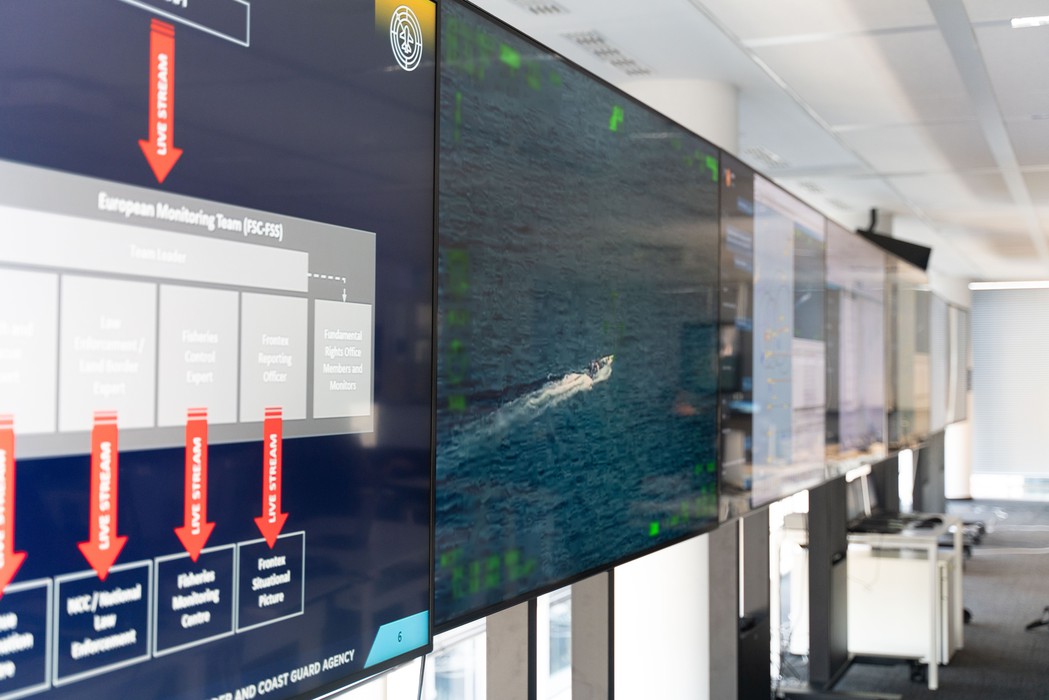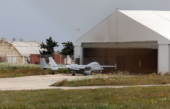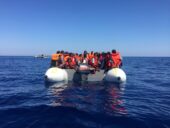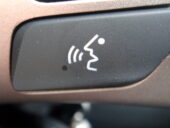Because Frontex also informs the Libyan Coast Guard about boats that are not in distress at sea, refugees are taking action against this practice at the EU. Frontex defames this as “publicity”.
Two weeks ago, Frontex confirmed that the number of people seeking protection and asylum crossing the Mediterranean to Europe is falling drastically. The border agency cited activities by authorities in Tunisia and Libya as the cause. In both countries, the EU Commission has financed equipment for the coastguards and pushed for the establishment of their own Search and Rescue zones (SAR zones).
The aim of this cooperation, which is costing hundreds of millions of euros, is to intercept boats before they reach European waters. Frontex supports this with aerial reconnaissance using aeroplanes and drones. The coordinates of boats that are not in distress are also passed on to North African coastguards. This is intended to prevent the occupants from reaching the sea rescue zone or the territorial waters of an EU member state in order to apply for asylum there.
This accusation was made by lawyers from the organisation Front-LEX, who submitted a petition to Frontex on 29 May together with a member of the organisation Refugees in Libya from Sudan. In it, the plaintiff calls on the new Frontex Director Hans Leijtens to stop the questionable cooperation and bases this on Article 265 of the Treaty on the Functioning of the European Union (TFEU). A “provisional measure” can be used to demand a review of whether an EU institution is honouring its obligations.
According to the lawyers, the transfer of position data to Libyan actors is a violation of the principle of non-refoulement and contributes to crimes against humanity. In Libya, many intercepted boat passengers are mistreated, tortured or killed.
Frontex reacted negatively to the request for an inspection. A spokesperson called it “irresponsible and reckless” and spoke of “publicity”. Frontex emphasised that it only communicates with the Libyan rescue coordination centre if a boat is in distress at sea. This is common practice, even for civilian organisations, they said to “nd”.
However, Frontex does not have its own criteria for checking whether boats are actually in distress at sea. According to Front-LEX and Refugees in Libya, Frontex pilots forward all position data to North African coastguards, especially in areas far away from European sea rescue zones. Frontex does not make contact with the refugee boats in this “pre-frontier area” in order to clarify an emergency situation.
The situation is different when boats are discovered within the SAR zone or the territorial waters of an EU member state. If Frontex does not categorise this as an emergency, the coastguards do not have to carry out rescue operations. For example, the shipwreck off Pylos in Greece was a disaster: despite being aware of the overcrowding and lack of life jackets, Frontex did not send a distress signal to all nearby ships. This is probably why at least 500 people drowned. In a subsequent investigation, the European Ombudsman Emily O’Reilly attested to Frontex’s shortcomings in responding to maritime emergencies.
In 2022, Front-LEX criticised Frontex’s actions in the Aegean Sea and called for a halt to its cooperation with the Greek coastguard. At the time, international media documented how Frontex assisted with pushbacks to Turkey – a practice that appears to be continuing. However, the interim director at the time, Aija Kalnaja, described such actions as isolated cases.
The current Frontex Director Leijtens appears to want to sit out the new allegations. A petition under Article 265 TFEU must be responded to within two months, but Leijtens let this deadline pass. His spokesperson does not want to comment on the reasons. “I’m afraid I am not able to share certain aspects of our legal strategies and internal considerations”, he said in response to an enquiry from “nd”.
Refugees in Libya is now preparing an action for failure to act at the EU Court of Justice, confirmed co-founder David Yambio. He calls the accusations from Warsaw “staggering”. Frontex is jeopardising the lives of refugees if they are handed over to Libyan militias. “Blaming victims of crimes against humanity for literally trying to protect their lives through legal actions represents a new level of cynicism, even for Frontex”, Yambio told “nd”.
Published in German in „nd“.
Image: Situation Centre at Frontex (Frontex).





Leave a Reply